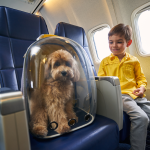
Italy just upgraded dogs to cabin class. No more cargo holds for dogs!

Italy Redefines Pet Air Travel: Dogs Take Their Place Beside Human Companions
For countless pet owners, the idea of placing a beloved dog in an airplane’s cargo hold can be distressing enough to make them cancel or rethink a trip altogether. Beneath the cabin floor lies a dim, noisy, and often unpredictable environment that can cause extreme stress—and in some tragic cases, injury or death—for animals. Until now, air travel regulations in most countries offered few alternatives for medium and large dogs, forcing owners to choose between their pets’ safety and their own travel plans.
This spring, however, Italy broke new ground in humane transportation policy. In a decision praised by animal welfare advocates, travelers, and veterinarians alike, the country’s civil aviation authority officially redefined how dogs can fly—opening the passenger cabin to many four-legged travelers who were once relegated to the hold. For a nation already celebrated for its pet-friendly train network, the move signals more than a regulatory change; it reflects a cultural shift toward recognizing the deep emotional bonds between humans and their animal companions.

A Landmark Policy for Canine Passengers
On May 12, 2025, Italy’s civil aviation authority—ENAC (Ente Nazionale per l’Aviazione Civile)—approved a groundbreaking update to pet travel regulations: medium and large dogs are no longer automatically assigned to the cargo hold. Instead, as long as the combined weight of the dog and its carrier does not exceed the average weight of a human passenger, they may travel in the cabin alongside their owner.
This is a dramatic break from the long-standing rule that limited in-cabin travel to animals under 10 kilograms (about 22 pounds), tucked into small carriers beneath the seat. Under the new system, approved carriers for larger dogs can be secured with a seatbelt—treating pets less like luggage and more like living passengers whose safety and comfort matter.
The implications are both practical and emotional. For years, owners have voiced concerns over the stress, disorientation, and potential health risks of cargo-hold travel, citing high-profile cases of pets lost, injured, or dying mid-flight. The new policy allows travelers to keep dogs visible, accessible, and comforted during the journey—making the experience safer for animals and less stressful for their humans.
While ENAC’s regulations set a national framework, each airline can establish its own conditions—such as limits on the number of in-cabin pets per flight or additional carrier specifications—subject to ENAC approval. Very large breeds exceeding the weight threshold are still excluded, but the policy dramatically expands options for owners of mid-sized and larger dogs.
Transport Minister Matteo Salvini, who championed the change, called it a “battle of common sense and civility,” stressing that pets are not freight but companions deserving humane treatment.
Why This Matters: The Emotional and Social Impact
For many, a dog is not just a pet—it’s a constant presence, an emotional anchor, and even a family member. In an era marked by rising stress, loneliness, and mental health struggles, the comfort provided by animals is more than sentimental—it’s scientifically proven. Research shows that interaction with dogs can lower cortisol levels, reduce blood pressure, and trigger oxytocin release, the hormone linked to bonding and trust.
Italy’s decision acknowledges this reality by validating the emotional significance of keeping pets close, even in public and regulated spaces like airplanes. It also mirrors how society increasingly redefines “family” to include non-human members. As one animal rights advocate noted, “You wouldn’t put a toddler in the cargo hold—why do it to a dog who is just as dependent and bonded to their caregiver?”
The policy also has an inclusivity dimension. For travelers with emotional support animals, especially those coping with anxiety, PTSD, or other conditions, proximity to their pet can be vital to well-being. While Italy does not create a special legal category for these animals, the end result is similar: a more humane travel experience that respects emotional needs.

Setting an International Example
Italy’s policy does not exist in a vacuum—it sets a precedent for the global aviation industry. With over 470 million pet dogs worldwide, demand for safe, dignified travel options is steadily growing. Airlines have often resisted accommodating larger pets in cabins, citing space and allergy concerns, but history shows that humane policies in one country can influence others. Animal welfare reforms—like banning cosmetic testing or ending puppy mills—often began regionally before becoming international norms.
In Europe, where travelers frequently cross borders by plane, train, or car, harmonizing pet travel rules could make cross-country trips far less stressful. Italy already offers consistency: its national railways welcome dogs under clear pet-friendly guidelines, meaning passengers can enjoy smooth, integrated travel from train to plane.
The ripple effect could be global. Airlines in North America, Asia, and other regions face growing customer pressure to rethink outdated pet policies. Italy’s model—balancing compassion with safety regulations—offers a practical blueprint for integrating larger pets into cabins without sacrificing operational efficiency.
Balancing Pet Inclusion with Passenger Comfort
While the new rule has been widely celebrated, it’s not without debate. For passengers with severe dog allergies or fear of animals, sharing a confined cabin can be uncomfortable. Italy’s policy leaves flexibility for airlines to manage such cases—possibly by limiting pet numbers per flight, seating animals away from allergy-sensitive passengers, or designating pet-free sections.
Airlines already employ strategies for allergen-sensitive travelers, such as advance seating requests, cabin air filtration systems, and recommending preventive medication. Importantly, allergens on planes are not exclusive to pets—perfumes, cleaning agents, and even certain foods can trigger reactions. The challenge lies not in whether pets should be present, but in ensuring inclusive solutions for all passengers.
More Than a Travel Policy—A Cultural Statement
Italy’s decision reflects a growing societal consensus: animals are not disposable cargo but valued companions whose needs deserve consideration in public infrastructure. By leading with both empathy and practicality, Italy has positioned itself at the forefront of compassionate, modern travel.
If other nations follow, the days of anxious owners pacing airport terminals while their pets endure the unknown in a noisy hold may soon be over. Instead, more dogs could share the journey from takeoff to landing, not just as passengers—but as family.
News in the same category


12 Health Hacks Doctors Rarely Share: Secrets for Optimal Health and Well-being

A Parade Moment That Became Global Joy

Nick Vujicic: Living Proof That the Human Spirit Knows No Limits

You’re Made of Stardust – Literally! 🌌🚀

Sea Levels Are Rising Faster Than At Any Time In 4,000 Years 🌍

Your Dog Might Actually Love You More Than Food

Deep Freeze Set to Slam the Eastern U.S. This December

Nike Co-Founder Phil Knight Makes Historic $2 Billion Donation to Cancer Research

Dutch Engineers Tackle the Pacific’s Plastic Crisis with 600-Meter Ocean Vacuum

How to Take a Loop of the Entire U.S. by Train

The Quiet Rise of Everyday Health-Tracking Technology

The Hidden Toll of People-Pleasing: How Emotional Suppression Can Trigger Autoimmune Disorders

The Pudu: The World’s Tiniest Deer and Its Role in South America's Forest Ecosystems

Deep Water Cycle: Scientists Discover Hidden Ocean Beneath Earth's Surface

Mexico City’s Sweeping Bullfighting Ban Marks Major Shift in Cultural and Animal-Welfare Policy

Los Angeles County Erases $180 Million in Medical Debt for 39,000 Residents

The 2025 Atlantic Hurricane Season Intensifies: A Heightened Risk for Major Storms

Europe Faces Unprecedented Heatwave: Rising Temperatures Strain People, Infrastructure, and Agriculture

Revolutionary Light-Based Cancer Treatment Offers New Hope with High Success Rate
News Post

CCF Tea to Burn Belly Fat

DIY Lip Balm with Vaseline and Beetroot: A Natural, Moisturizing Solution for Soft, Pink Lips

Coffee Gel For Eye Wrinkles

Coffee For Instant Skin Brightening

Japanese 4 Steps Glow Secret

30 minutes treatment for dark lips

How to Make a DIY Aloe Vera Night Cream for Glowing Skin

Rice Water Toner To Get Skin That Shines Like Diamond

Salon like Keratin Treatment at Home

Experts reveal the top 7 Shampoos to tackle hair loss effectively

10 Surprising Beauty Hacks You Never Thought You Could Do With Baby Powder

DIY Night Serum For Radiant Skin

Top 8 Foods to Clean and Restore Your Liver Naturally

The Ancient Secret Seed That Revolutionized Wellness: Unlocking the Power of Hibiscus and Cloves

Garlic Remedy for Removing Moles and Skin Tags Naturally: What Works and What to Know

Fibromyalgia: The Hidden Energy Crisis Behind Your Pain, Fatigue, and Sleepless Nights

The Hidden Oil That Sparks Her Desire and Rekindles Your Marriage

Unlock the Ancient Secret of Peach Tree Resin: 15 Life-Changing Benefits You’ll Wish You Knew Sooner

Aloe Vera & Cinnamon: The Traditional Duo That Naturally Supports Your Health, Vitality, and Vision
